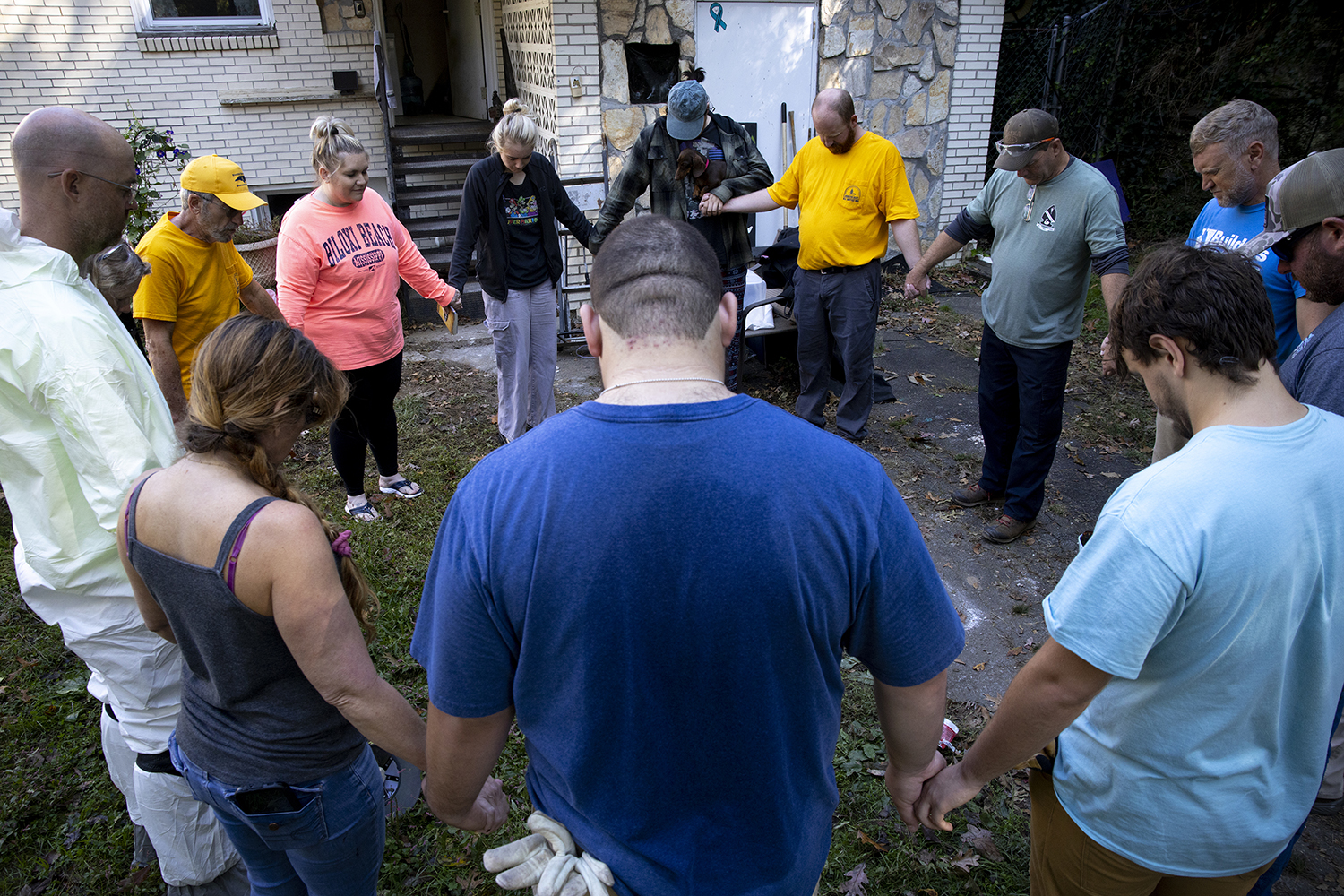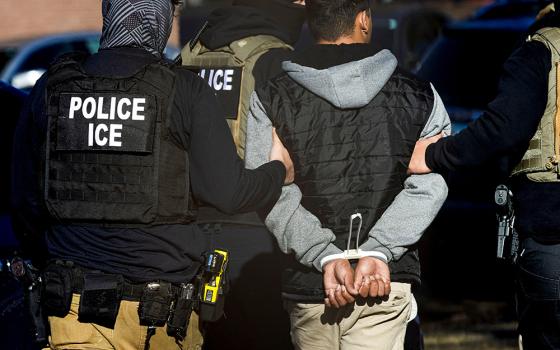
Volunteers serve in Spruce Pine at 1st Baptist Church providing meals for the community, yellow shirts and search and rescue. Recovery teams are deployed to assist homeowners with cutting down trees along with mudding and tearing out damage. (Courtesy of Baptists on Mission)
In late January, North Carolina Governor Josh Stein announced $30 million in grants to fund his state's recovery from Hurricane Helene.
Included in that total was $6 million for two faith-based groups helping rebuild homes after the storm: $3 million for Habitat for Humanity, a housing nonprofit based on Christian principles; and $3 million for Baptists on Mission, an auxiliary of the Baptist State Convention of North Carolina.
The Baptists plan to use their $3 million to buy building supplies to repair as many as 1,000 homes in the coming year, said Richard Brunson, executive director of Baptists on Mission.
Brunson told Religion News Service that accepting the grants made sense.
"More than half the cost of building is labor, but with volunteers providing the labor we can double or even triple the number of families that we can get back in their homes," Brunson said in accepting the grant. He also thanked Stein for a previous state grant of $5 million for disaster relief.
But the Baptists' decision to accept the grant comes as faith-based groups such as Church World Service, Lutheran Services in America, Catholic Charities and World Relief have been under fire for accepting federal funds for helping immigrants and refugees. President Donald Trump's political allies have called the grants "money laundering" and "illegal," while some of the president's religious allies accuse charities of selling their faith out to liberals.
The Center for Baptist Leadership, run by former Trump administration staffer William Wolfe, claimed that a ministry center run by Send Relief, a Southern Baptist ministry, violated the denomination's official statement of faith by accepting government funds in a partnership with World Relief to assist refugees.
"The fact that Send Relief took federal grant funding from the Biden State Department, laundered through World Relief, is shocking," the Center for Baptist Leadership claimed.
To back the claim, the center pointed to a section of the Baptist Faith & Message that opposed any taxes that would benefit churches — a reference to long-held Baptist opposition to state churches.
"The church should not resort to the civil power to carry on its work," the Baptist Faith & Message states. "The gospel of Christ contemplates spiritual means alone for the pursuit of its ends."
The Trumpworld criticism is at odds with last week's announcement that Paula White-Cain, a close adviser to Trump, would head the White House Faith Office, which promotes partnerships between faith groups and the government. The first such office began in the George W. Bush administration, which built on federal legislation called Charitable Choice that began to loosen restrictions on government grants to faith groups in the 1900s.
Trump's recent executive order establishing the faith office said faith groups should be able "to compete on a level playing field for grants, contracts, programs, and other Federal funding opportunities."
Texas pastor Bart Barber, an expert on SBC polity, said Baptists have long opposed direct government funding of churches. Early American Baptists Roger Williams and Isaac Backus clashed with government leaders over state funding to establish a church in New England, while in Virginia, Baptist leader John Leland opposed a "general assessment bill" in the 1780s that would have taxed everyone and sent the money to the church of their choice.
"They thought it would make Baptists, Methodists, everybody happy," said Barber. Instead, Baptists sank the bill.
"We're just not in favor of tax money being used to support ministry objectives," said Barber.
Advertisement
A former SBC president, Barber said he felt so strongly about separation of church and state funding, that his church, First Baptist Church in Farmersville, Texas, did not apply for a Paycheck Protection Plan loan during the COVID-19 pandemic, which would have been used to pay the salaries of pastors. For Barber, that was out of bounds.
First Baptist did allow the local city to build a parking lot on a property the church owns. The city needed more parking, Barber said, and the church would be able to use the lot on Sundays or for special events. The difference, said Barber, is that the parking lot was a secular amenity that the church also supported, while the PPP loan represented government funding for a purely religious purpose.
Barber also said that many Baptist charities, such as children's homes or hospitals, have received grants from the government for the work they do for the community. That, he said, is not seen as a violation of the SBC's statement of faith or of Baptist principles.
Albert "Al" Mohler, longtime president of Southern Baptist Theological Seminary, said that until recently, there had been a consensus among leaders of national entities on the issue of government funds.
"When I was elected president, there was an absolute consensus among SBC leaders that SBC institutions should not take government money of any kind," he said. "If that sentence did not end in a period, it ended in an exclamation point."
That consensus was so strong, said Mohler, that SBC seminaries only accepted funds under the G.I. Bill because they paid for the tuition of specific individuals. Mohler said that by the same logic, Baptist colleges and universities eventually began to take government funds, like Pell grants and federal student loans.
His seminary, however, decided not to accept federal student loans, foregoing millions. Nor did the seminary take out a PPP loan. "I believe it's a simple principle of maintaining our independence from the government and our ability to be absolutely free from government interference," he said. Other seminaries, he added, have made their peace with taking the loans.
When it comes to other charitable work, such as health care or disaster relief, government funding and oversight are difficult to avoid, but Mohler said such payments don't compare to theological education or pastors' salaries.
He also believes the Baptist Faith and Message assumes a strict line between the church and the government.
"It definitely wants the church to be free from the interference of the state and Southern Baptist institutions, to follow the very same … principles," he said. "I have colleagues who hold different positions, but, you know, they're the ones who moved."
The Baptist Center for Leadership did not respond to a question of whether it objects to Baptists accepting funding like PPP loans. The SBC Executive Committee, which governs the denomination day to day, did not respond to a question of whether accepting government grants violated the Baptist Faith & Message. The Executive Committee, like a number of SBC state conventions, institutions, and churches, did take a PPP loan.
"Because of our partnership with more than 47,000 churches, Southern Baptists' generosity and gifts from thousands of private donors, the North American Mission Board and Send Relief are not dependent on government funding," a spokesman for the SBC's North American Mission Board told RNS. "There are times, in relief settings, when we collaborate with other non-governmental organizations that have received government grants. Sometimes those organizations provide food, funding or other material goods that we utilize for our response. We would never accept any assistance that would require us to compromise our faith and ministry in any way."
In North Carolina, Brunson said that Southern Baptists will help rebuild after disasters whether the government provides funding or not, and if Baptists on Mission can get a family back in their home by doing what he called "essential rapid repairs" for about $20,000 while using volunteer labor, he said, "as far as I am concerned, God is providing these funds."




